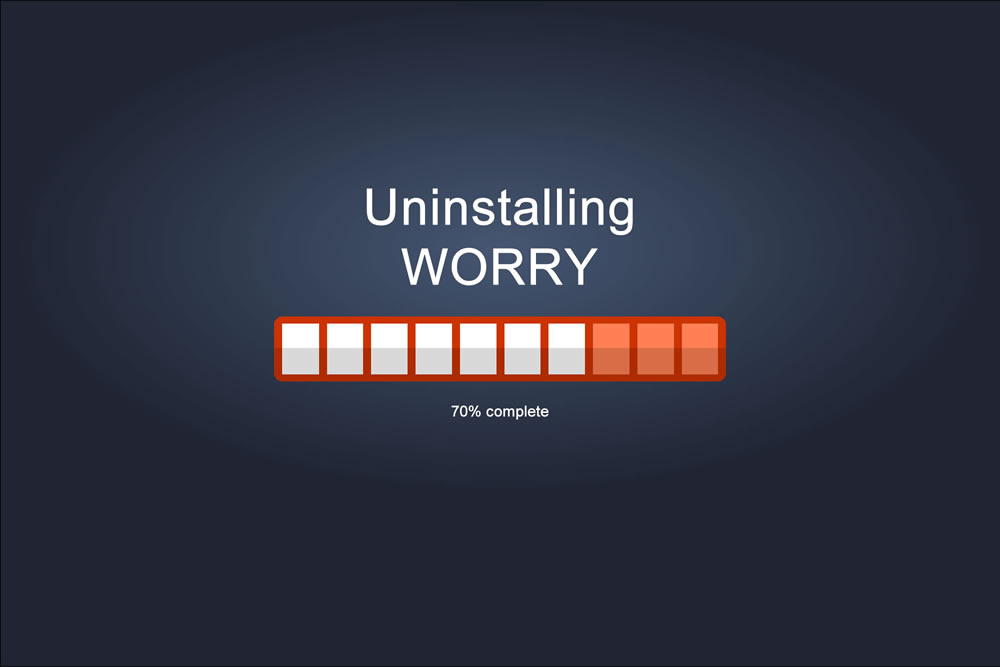Born to Worry?
Reviewing Part 1 reminds us that the most powerful stress & anxiety generator is the one mounted on our shoulders. How we think greatly influences how we feel and act. Worry may seem automatic and beyond our control (and for some voodoo-ers seems to prevent unwanted things from happening), but despite genetic predispositions to obsess, worry is actually a practiced choice.
Applying some REBT here (since space is limited), I wish to show how you — or someone you care about — can grow from WORRIER to WARRIOR, while developing the calming power of your own, innate, relaxation response.
Control & Certainty
Worriers tend to bang their anxious heads against the walls of control & certainty. In the grand scheme of things, we have very little of either, yet still make demands for both.
The tragic invasion of Ukraine, with the gut-wrenching suffering juxtaposed with awe-inspiring courage, easily evokes anger & frustration and anxiety & fear. Though not unimportant, our charitable giving can seem anemic against the destructive forces we have no individual power to stop or control. And contemplating the possible outcomes, some of which seem horrific but none of which can be known at this time, fuels endless uncertainty.
Some REBT
Access to anxiety is largely denied when we try hard to reject the well-practiced irrational beliefs that:
A- people & things “should” and “must” be the way we want
B- it’s “awful” and “terrible” (100% bad) when they are not
C- we “can’t stand” discomfort or what’s not to our liking
Now let’s attack the disturbance-creating A-/B-/C-/ irrational thoughts above, in good ‘ole REBT fashion, in order to help our Worriers feel better. I will replace each unrealistic thought with a more factual one:
A+ I want to know, to have certainty & control but don’t have to have it. I don’t need what I merely want.
B+ Awful connotes 100% bad, yet all my “bads” could have been much worse; few things are truly awful.
C+ But I’ve tolerated every lousy thing that’s ever happened to me. I really mean to say, I don’t like it!
The Apocalyptic Rabbit Hole
Let’s try out our REBT chops and tackle one of the Worrier’s most potent tools for producing anxiety. That is “what if…” thinking which was briefly touched upon in Part 1 and includes A-/B-/C- (and more).
Worriers become paralyzed by their dreadful demands that some unwanted event that they cannot control be prevented from happening and, since it can’t, how awful it is and they just can’t stand it. And since nothing really dreadful has happened and doomsday hasn’t yet arrived, many Worriers are willing to continue to pay the price of anxiety and associated biopsychosocial burdens. Since you’re not, hopefully, let’s explore the world of catastrophic possibilities:
♠ Nuclear Winter ♠ Global Warming ♠ Doomsday Clock ♠ MAD (Mutually Assured Destruction)
♠ Floods ♠ Cyber Warfare ♠ Corona Mass Ejection ♠ Grid Takedown ♠ Identity Theft ♠ Flesh Eating Bacteria
♠ Stock Market Crash ♠ Next Pandemic ♠ Mass Shooting ♠ Murder Hornets ♠ Famine ♠ Death & Dying
Note that these are all undesirable possibilities (except death) and not probabilities. Many have already happened, yet we are still here. And there are some Worriers right now who are suffering anxiety — not just appropriate concern — because of their A-/B-/C- irrational thinking in regard to the above “calamities.”
Worry Doesn’t Work
So why haven’t you been worried about ALL the above possibilities? Wouldn’t it make sense that a card-carrying Worrier give adequate anxious attention to most everything that can go wrong? Well, for one thing, worrying about everything doesn’t make sense to you. Partly because you acknowledge that you don’t even know all the things that you “should” be worrying about (that hopefully this exercise is showing you).
Then why does worrying about one thing (at a time) make sense? It doesn’t. So why worry (anxiously) about anything? Because for most, it is not a choice but a habit — like any other habit. When we’re wired for worry (like I am), our automatic default is to worry anxiously — not merely feel concerned.
Breaking the Worry Habit
The Worrier habitually reacts with alarm to an intrusive thought/perception by evaluating it through the distorted lens of A-/B-/C- self-defeating thinking. That’s why a Worrier can lose sleep over maybe having left the attic light on, while having no concern that the un-maintained furnace is filling up the basement with carbon monoxide.
Worry is selective suffering, and a highly ineffective over-focus on some bad things (that as Marcus Aurelius and Mark Twain have noted, rarely materialize), while we possibly get blind-sided by something else we failed to “worry” about. The solution is not to get better at worrying! Concern works better and facilitates:
What Humans Do Best: Problem Solving
Problem-solving is enhanced by being concerned—not anxious. In fact, most all performance including problem-solving is enhanced by concern—not anxiety. That is why my work with clients includes relaxation training in addition to REBT. Worriers can become Warriors by learning to (1) relax at will; (2) change A-/B-/C- thinking to A+/B+/C+ and (3) find a solution(s) to the question: “so, what if…?”
But That Would Be Awful!
Awful mainly doesn’t exist except as we think it so, remember? So what if that dreaded, or undesirable, event/situation should occur? What would that be like? What might we do? What would others do? If humans are anything we are problem solvers, yet we often seem to approach adversity as if this was our first rodeo; as if we haven’t been solving our problems daily for our entire lives up to this very moment.
Problem solving displaces anxiety because it puts us in our wheelhouse. We can remind ourselves that as much as we want to know what we can’t know (like the future), and control what is not within our power (like what other people think and do), the reality (which is our best friend) is that we don’t have to have certainty or control and can learn to get by nicely without it. Thankfully, we don’t need what we want.
Preferential — rather than demanding — thinking is key to emotional well being and Rational Living.
Worriers to Warriors
Although this post has merely scratched the surface for achieving freedom from worry & anxiety, you are welcome to contact me for additional information and skill mastery.
TAKEAWAY
“Never let the future disturb you. You will meet it with the same weapons of reason which today arm you against the present.”
~ Marcus Aurelius, Meditations





